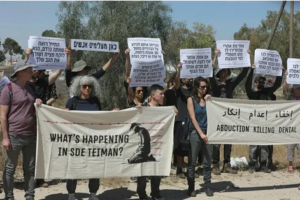Internal IDF report finds two Gazans died after being beaten en route to Israeli prison

A protest outside Israel’s Sde Teiman detention facility, April 2024
Bar Peleg and Josh Breiner report in Haaretz on 28 May 2024:
An Israeli Military Police investigation found that two detainees who were taken from Gaza to the Sde Teiman detention facility in Israel were beaten and later died, say two sources who spoke with Haaretz.
The two detainees, who were arrested by IDF soldiers in March in the Khan Yunis area on suspicion of being terrorists, were alive and bound with a strap when they were put on a truck. They were found dead when they arrived at Sde Teiman, a temporary detention facility near Be’er Sheva, operated by the army.
The investigation’s findings contradicts the soldiers’ claim that the two might have died as a result of the extremely bumpy ride over rough terrain. The soldiers are suspected of beating the detainees in multiple body parts, and the evidence suggests that one of them sustained head injury. The army will determine how to proceed with the investigation once an autopsy has been conducted.
The Military Police Criminal Investigation Division is investigating the incident, which was first reported by the Kan Public Broadcaster last month. Several soldiers have been questioned under caution, but no one was arrested on suspicion of causing the death of the two men, as in 33 other deaths of residents of the Gaza Strip who were arrested during the war and brought to Israel.
The Military Police is investigating in recent months the deaths of 35 Gazan detainees have died in Israeli detention facilities or while being detained by the army. Military Police investigations were opened into all of the incidents, but no soldiers have been arrested in any of the cases. These cases account for half of the investigations opened by the Military Police relating to offenses allegedly committed during the war.
Sources in the army say that two other detainees who were held by the army died suddenly as a result of neglect or inadequate medical treatment and died from diseases and infections that spread in the facility. The conditions in which the detainees are kept at Sde Teiman, which were reported by Haaretz and the world press is an issue slated to be discussed by Israel’s High Court of Justice next week.
The state has recently begun staffing the facility with reservist women guards who do not have combat training, and with women soldiers from the Education and Combat Support units, and there have been complaints about being sexually harassed by the prisoners.
The army would like Sde Teiman to continue to serve as a temporary detention facility where suspects are held until there is a decision on whether or not to transfer them to military prisons run by the Israel Prison Service.
Last week, the UN Special Rapporteur on Torture issued a statement calling on Israel to investigate serious allegations of torture and abuse in the military prisons and detention facilities. Her position was made public following an inquiry from the Committee Against Torture in Israel and other human rights organizations.
A medical source told Haaretz that the health situation in Sde Teiman is dire. “It’s an incubator of diseases,” one source said, noting that at least two of the prisoners died from diseases and infections that developed there, as well as from a suspected lack of medical care. Another source who spoke with Haaretz expressed surprise about the cases of “sudden death” that are harder to explain. “It’s another world, a black hole,” the source said.
In another case, which happened in the Israel Prisons Service’s Ofer Prison, an inmate died in the service’s clinic. Izz a-Din Al-Bana, 40, a wheelchair-bound patient who was arrested in Gaza died “suddenly,” according to a source familiar with the details of his case.
The source expressed surprise how a man who lived 18 years with a disability died suddenly and wondered what caused his condition to deteriorate. The source said he thought his death resulted from a lack of medical care. According to a lawyer who visited the facility, prisoners there told him that Al-Bana was paraplegic and had severe pressure sores. One of the prisoners told the lawyer that Al-Bana had looked yellow and sounded like he was dying but received no care.
The IDF said in response: “The IDF operates according to the law and within the framework of Israeli and international law when it comes to the treatment of detainees. Following the death of the two detainees [on their way to Sde Teiman] the Military Police opened an investigation. Naturally, it is not possible to give details about an investigation that is still underway.”
The IDF and the Israel Prison Service referred to each other for response to an inquiry about the death of Al-Bana in Ofer prison, and did not address the substance of the allegations.
This article is reproduced in its entirety
